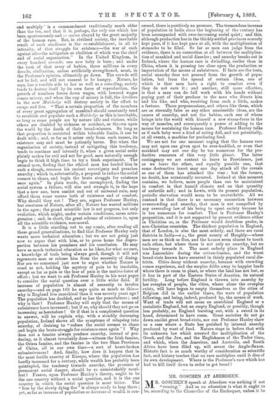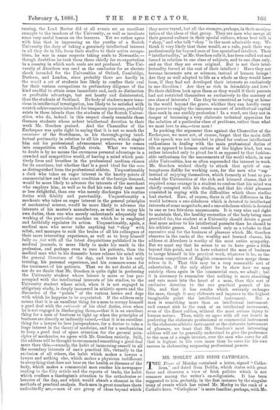MR. GOSCHEN AT ABERDEEN.
MR. GOSCHEITS speech at Aberdeen was nothing if not "rousing." And as no education is what it ought to be, according to the Chancellor of the Exchequer, unless it be rousing, the Lord Rector did at all events set an excellent example to the teachers of the University, as well as inculcate some very useful lessons on the learners. Yet we rather agree with him that in impressing on the youths of a Scotch University the duty of taking a genuinely intellectual interest in all they do in life, from their studies to their active occupa- tions, he was in some respects taking coals to Newcastle,— though doubtless he took them there chiefly for re-exportation to a country in which such coals are not produced. The Uni- versity of Aberdeen was used as the conductor for an electric shock intended for the Universities of Oxford, Cambridge, Durham, and London, since probably there are hardly in the world a set of students less likely to confine their zeal for their various occupations to perfunctory diligence of the kind needful to attain some immediate end, such as distinction or profitable advantage, but not hearty and disinterested, than the students of Scotland. No body of students more tena- cious in intellectual investigation, less likely to be satisfied with scratch achievements intended for temporary purposes, probably exists in these islands than the students of the Scotch Univer- sities, who do, indeed, in this respect closely resemble those German students whose ardent intellectual devotion to their work Mr. Goschen praised. And the Chancellor of the Exchequer was quite right in saying that it is not so much the canniness of the Scotchman, as his thorough-going intel- lectual pertinacity in relation to all his pursuits, which singles him out for professional advancement wherever he comes into competition with English rivals. What we venture to doubt is by no means the enormous personal advantage in a crowded and competitive world, of having a mind which posi- tively lives and breathes in the professional medium chosen for its exertions, but whether that is a good ideal for the man as distinguished from the professional athlete. Unquestionably a clerk who takes an eager interest in the knotty points of commercial law and the exact condition of the foreign demand, would be more likely to advance the interests of the merchant who employs him, as well as to find his own daily task more or less delightful, than one who merely discharges his routine duties with fidelity and punctuality. Unquestionably a mechanic who takes an eager interest in the general principles of mechanical science, would be more likely to advance the interests of his master's manufactory, as well as to enjoy his own duties, than one who merely understands adequately the working of the particular machine on which he is employed and faithfully regulates its action. Unquestionably, again, a medical man who never talks anything but " shop " with relish, and manages to suck the brains of all his colleagues of their more interesting experience, as well as to keep himself fully au fait with all the latest disquisitions published in the medical journals, is more likely to make his mark in the profession, and perhaps even to cure his patients, than the medical man who in his domestic hours relaxes his mind with the general literature of the day, and trusts to his early training, his personal experience, and his common-sense for the treatment of his patients. That we do not doubt at all, nor do we doubt that Mr. Goschen is quite right in preferring the University student whose leisure is more or less pre- occupied with the intellectual interests of his studies, to the University student whose mind, when it is not engaged in obligatory study, is deeply immersed in athletic sports and the discussion of the " points " of the various horses and dogs with which he happens to be acquainted. If the address only means that it is an excellent thing for a man to occupy himself a good deal with the rationale of his chief duties, even when he is not engaged in discharging them,—that it is an excellent thing for a man of business to light up when the principles of business are directly or indirectly raised,—that it is an excellent thing for a lawyer to love jurisprudence, for a doctor to take a large interest in the theory of medicine, and for a mechanician to keep a good deal of spare attention for the general prin- ciples of mechanics, we agree with Mr. Goschen entirely. Still, the address will be thought to recommend something a good deal more than this,—namely, the habit of immersing oneself in all the secondary interests of one's practical life, virtually to the exclusion of all others, the habit which makes a lawyer a lawyer and nothing else, which makes a physician indifferent to everything that does not bear on the health or diseases of the body, which makes a commercial man confine his newspaper reading to the City article and the reports of trade, the habit which confines a theologian's attention to the orthodoxies or heresies of the day, and which would absorb a chemist in the methods of practical analysis. Such men in great numbers there undoubtedly are,—men of one group of ideas beyond which
they never travel, but all the stronger, perhaps, in their manipu- lation of the ideas of that group. They are men who merge all their general culture in their special culture, whose best talk is "shop," and who talk " shop " in the most admirable way. We think it very likely that these would, as a rule, push their way professionally far beyond men of less specialised intellect. Their "intellectuality," as Mr. Goschen calls it, has been called out and forced in relation to one class of subjects, and to one class only, and on that they are even original. But is not their intel- lectuality forced at the cost of their intellect ? Have they not become incarnate arts or sciences, instead of human beings ? Are they as well adapted to life as a whole as they would have been, if they had not developed their interests so exclusively in one direction ? Are they as rich in friendship and love ? Do their children look upon them as they would if their parents had not restricted themselves so exclusively to the mastery of one class of interests ? Can they be conceived as being at home in the world beyond the grave, whither they can hardly carry the power to employ the immense amount of intellectual capital thus sunk in one earthly profession ? In a word, are they not in danger of becoming a very elaborate technical apparatus for the solution of a particular class of problems, rather than what we most love to see,—true men ?
In pushing the argument thus against the Chancellor of the Exchequer, we must not, of course, forget that the main drift of his speech was not intended to plead for zealous intellectual enthusiasm in dealing with the main professional duties of life as opposed to human culture of the higher kind, but was rather intended only to plead for it as opposed to that fashion- able enthusiasm for the amusements of the world which, in our older Universities, has so often superseded the interest in work. Mr. Goschen wished chiefly to attack that spirit of con- temptuous dislike for working men, for the men who " sap " instead of enjoying themselves, which formerly at least so per- vaded the Universities of the rich and leisured classes, that it required some courage in a student to confess that his mind was chiefly occupied with his studies, and that his chief pleasure consisted in coping with the difficulties which these studies had started. Now, of course, there is all the difference in the world between a one-sidedness which is devoted to intellectual interests of some magnitude, and a one-sidedness which is devoted to one or two frivolous amusements. It is very wise and right to maintain that, the healthy recreation of the body being once provided for, the student at a University should devote a great deal more ardour to his intellectual pursuits than he should to his athletic games. And considered only as a rebuke to that excessive zeal for the business of pleasure which Mr. Goschen observes in the ranks of the wealthy and learned classes, his address at Aberdeen is worthy of the most entire sympathy. But we must say that he seems to us to have gone a little beyond this point, and to have exhorted the man of business to merge himself in his practical work, whatever it be, as the German competitors of English commercial men merge them- selves in it. That this may be a very reasonable sort of exhortation, if the only object be to show how we may outstrip them again in the commercial race, we admit ; but it is necessary to remember that nothing is more absorbing and eats more into the heart of a man, than this sort of exclusive devotion to the one practical pursuit of his life, and that it has results which seriously endanger the man, though it may elaborate and improve to the highest imaginable point the intellectual instrument. But a man is something more than an intellectual instrument, and cannot sink to the rank of an intellectual instrument, even of the finest calibre, without the most serious injury to human nature. Thus, while we agree with all our hearts in preferring the elaborate professional or commercial instrument to the elaborate athletic instrument or the elaborate instrument of pleasure, we trust that Mr. Goschen's most interesting
address will not be generally understood to give the preference to the man of a single interest, over the man who cares for all that is highest in life even more than he cares for his own success in elaborating surpassing professional powers.



































 Previous page
Previous page